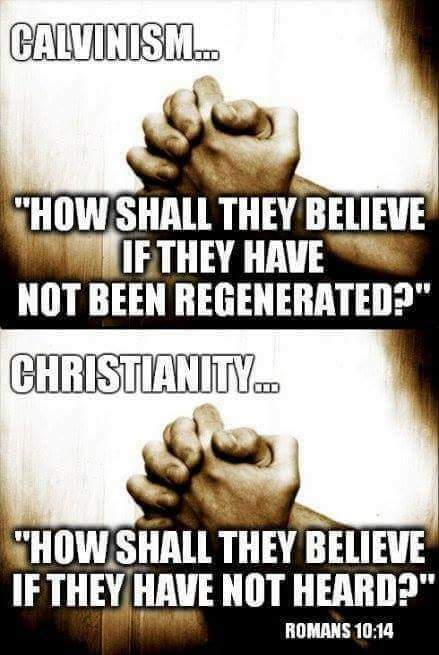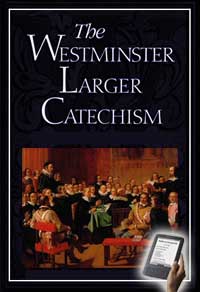The Use of Means in Regeneration

One of the great benefits of the Internet is that nothing stays hidden within a single community very long. When false statements are made and bandied about, the likelihood of them being exposed for what they are is much more likely than when there was no Internet and teachers could speak to their flock in a closed bubble community.
This week I ran into this meme online posted by someone who obviously did not think very highly of Calvinism.
It says Calvinism [teaches that] "how shall they believe if they have not been regenerated" while Christianity teaches "How they shall believe if they have not heard?"
The man who posted this meme made it quite easy for his followers to disprove a strawmen version of "Calvinism" since it gives the very misleading impression that people who embrace a Calvinist view of God's sovereign grace don't believe in the necessity of preaching the gospel. Talk about false dichotomies. I have yet to meet any classical Calvinists who think people can be saved without hearing someone preach the gospel to them. But I have, upon occasion, heard some Arminians teach that many of those who never hear the gospel in their lifetime will still have an opportunity to repent after they die. No, the fact is that Reformed believers are adamant for the need to preach the gospel to every creature, or they won't be saved. The problem with the meme is that it sees this as a stark either/or choice. Either you are teaching 1) that you must be regenerated to be saved or 2) you are teaching that someone must hear the gospel and respond to it to be saved. But you can't be teaching both. That is a false dichotomy The Bible teaches that it is both:

 "Since prayer is an aspect of our sanctification, our development or growth in godliness, it too must be understood as the fruit of what Christ has done for us. This is often the missing dimension in books and sermons on prayer...Problems emerge when the task of praying is urged without the motive and pattern of the unique saving role of Jesus. It then becomes a legalistic burden that cannot promote godliness...
"Since prayer is an aspect of our sanctification, our development or growth in godliness, it too must be understood as the fruit of what Christ has done for us. This is often the missing dimension in books and sermons on prayer...Problems emerge when the task of praying is urged without the motive and pattern of the unique saving role of Jesus. It then becomes a legalistic burden that cannot promote godliness... by John Calvin
by John Calvin
 by J. Gresham Machen
by J. Gresham Machen The following free eBooks by Benjamin Warfield are available in ePub,.mobi and .pdf formats, accessible for your eReading device. These are classic works which are all highly recommended. We believe no one should be held back from having a significant library of these important works because of cost so please spread the word to your friends so as many people as possible can make good use of this edifying literature.
The following free eBooks by Benjamin Warfield are available in ePub,.mobi and .pdf formats, accessible for your eReading device. These are classic works which are all highly recommended. We believe no one should be held back from having a significant library of these important works because of cost so please spread the word to your friends so as many people as possible can make good use of this edifying literature. "As Christians, we don't need to 'win' when it comes to politics. We don't need to tie our hopes to one party or react with fury when the other guy gets in, as though some mere human might thwart God's plans - as though God sits in heaven and says, 'Oh this democratic system is really messing things up. I can't achieve my plans now they voted for that one. They were meant to chose the other way!.' As the pastor Juan Sanchez puts it in his book 1 Peter for you:
"As Christians, we don't need to 'win' when it comes to politics. We don't need to tie our hopes to one party or react with fury when the other guy gets in, as though some mere human might thwart God's plans - as though God sits in heaven and says, 'Oh this democratic system is really messing things up. I can't achieve my plans now they voted for that one. They were meant to chose the other way!.' As the pastor Juan Sanchez puts it in his book 1 Peter for you: by Stephen Charnock
by Stephen Charnock